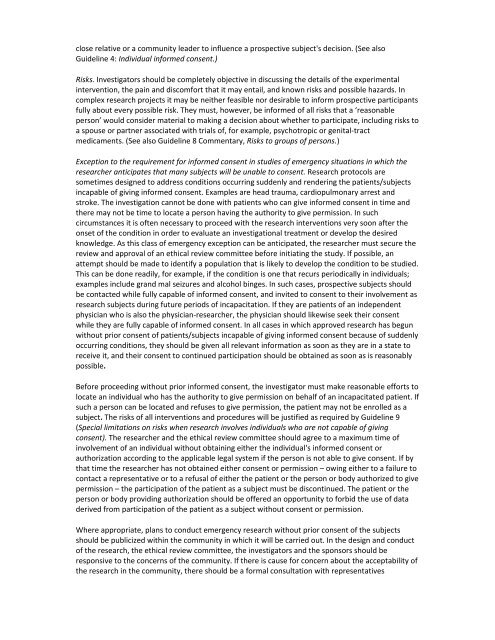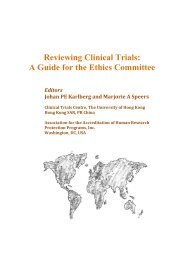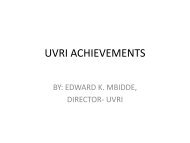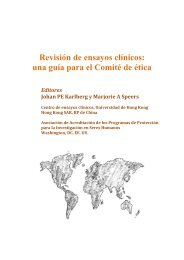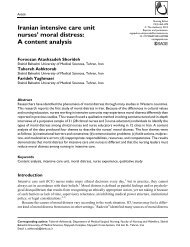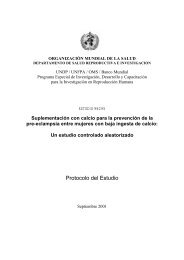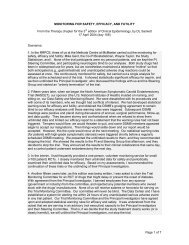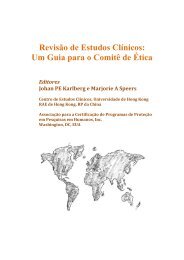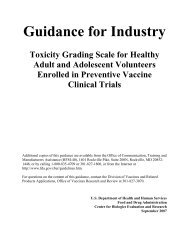CIOMS Guidelines - Global Health Trials
CIOMS Guidelines - Global Health Trials
CIOMS Guidelines - Global Health Trials
- No tags were found...
You also want an ePaper? Increase the reach of your titles
YUMPU automatically turns print PDFs into web optimized ePapers that Google loves.
close relative or a community leader to influence a prospective subject's decision. (See alsoGuideline 4: Individual informed consent.)Risks. Investigators should be completely objective in discussing the details of the experimentalintervention, the pain and discomfort that it may entail, and known risks and possible hazards. Incomplex research projects it may be neither feasible nor desirable to inform prospective participantsfully about every possible risk. They must, however, be informed of all risks that a ‘reasonableperson’ would consider material to making a decision about whether to participate, including risks toa spouse or partner associated with trials of, for example, psychotropic or genital-tractmedicaments. (See also Guideline 8 Commentary, Risks to groups of persons.)Exception to the requirement for informed consent in studies of emergency situations in which theresearcher anticipates that many subjects will be unable to consent. Research protocols aresometimes designed to address conditions occurring suddenly and rendering the patients/subjectsincapable of giving informed consent. Examples are head trauma, cardiopulmonary arrest andstroke. The investigation cannot be done with patients who can give informed consent in time andthere may not be time to locate a person having the authority to give permission. In suchcircumstances it is often necessary to proceed with the research interventions very soon after theonset of the condition in order to evaluate an investigational treatment or develop the desiredknowledge. As this class of emergency exception can be anticipated, the researcher must secure thereview and approval of an ethical review committee before initiating the study. If possible, anattempt should be made to identify a population that is likely to develop the condition to be studied.This can be done readily, for example, if the condition is one that recurs periodically in individuals;examples include grand mal seizures and alcohol binges. In such cases, prospective subjects shouldbe contacted while fully capable of informed consent, and invited to consent to their involvement asresearch subjects during future periods of incapacitation. If they are patients of an independentphysician who is also the physician-researcher, the physician should likewise seek their consentwhile they are fully capable of informed consent. In all cases in which approved research has begunwithout prior consent of patients/subjects incapable of giving informed consent because of suddenlyoccurring conditions, they should be given all relevant information as soon as they are in a state toreceive it, and their consent to continued participation should be obtained as soon as is reasonablypossible.Before proceeding without prior informed consent, the investigator must make reasonable efforts tolocate an individual who has the authority to give permission on behalf of an incapacitated patient. Ifsuch a person can be located and refuses to give permission, the patient may not be enrolled as asubject. The risks of all interventions and procedures will be justified as required by Guideline 9(Special limitations on risks when research involves individuals who are not capable of givingconsent). The researcher and the ethical review committee should agree to a maximum time ofinvolvement of an individual without obtaining either the individual's informed consent orauthorization according to the applicable legal system if the person is not able to give consent. If bythat time the researcher has not obtained either consent or permission – owing either to a failure tocontact a representative or to a refusal of either the patient or the person or body authorized to givepermission – the participation of the patient as a subject must be discontinued. The patient or theperson or body providing authorization should be offered an opportunity to forbid the use of dataderived from participation of the patient as a subject without consent or permission.Where appropriate, plans to conduct emergency research without prior consent of the subjectsshould be publicized within the community in which it will be carried out. In the design and conductof the research, the ethical review committee, the investigators and the sponsors should beresponsive to the concerns of the community. If there is cause for concern about the acceptability ofthe research in the community, there should be a formal consultation with representatives


